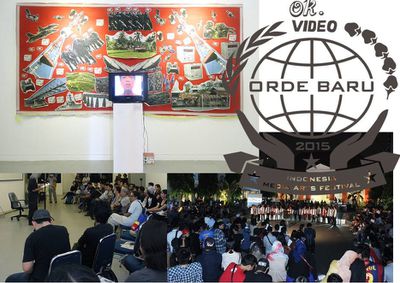18 Jan 2012
Social media trends in Southeast Asia

This is one of several interesting trends shared at the 3rd ASEAN Media Forum held in Singapore on 16-17 December 2011. The Forum, organised by the Asian Media Information and Communication Centre (AMIC), Singapore in collaboration with Friedrich Ebert Stiftung, Germany, gathered senior journalists, media commentators and researchers from Southeast Asia, to explore the potential of social media in community building in the ASEAN (Association of Southeast Asian Nations) region.
[caption id="attachment_18319" align="aligncenter" width="480" caption="Image by Matt Hamm. Used under a Creative Commons License."]
The Forum threw light on recent developments in social media usage by individual citizens, community networks and governments in Southeast Asia, while also calling attention to challenges at hand. The emergent trends and pressing issues discussed are presented below.
Individuals and social media
Individuals across Southeast Asia are demonstrating a high adoption rate to technology, in general and social media, in particular.
The social networking service and website, Facebook appears to be markedly popular with both individual users and community networks. Highlighting the steady increase in internet use by individuals in Myanmar in recent years, U Pho Naing Lin, Chief Editor, Popular News, Myanmar revealed that around 40% of internet users in his country have Facebook accounts.
In some countries, increased online connectivity is being fostered by a fundamental change in the public’s perception of social media. In Thailand, for example, the microblogging service, Twitter was considered no more than a channel for ‘personal chat among elites’ even five years ago. However, it is now acknowledged as a channel through which the ‘voices of ordinary people’ is being widely heard, shared Palphol Rodloytuk, Associate Dean, School of Liberal Arts, Shinawatra University, Thailand. The opinions and ideas of citizens expressed on Twitter are regularly retweeted by an ever-growing community of online users and, at times, the mainstream media as well. As a result, posts by individuals are being shared and amplified in unprecedented ways.
Communities and social media
Several speakers the Forum reaffirmed the potential of social media in community building in the ASEAN region.
Effective community networks seem to form in cyberspace, especially in times of physical emergences. Citing the case of recent floods in Thailand, Shinawatra University’s Rodloytuk pointed out that social media surpassed mainstream media and official channels in effectively coping with the rapid pace of information to be communicated to the affected public. During the floods, the need of the hour was for a voice of ‘authenticity’ rather than mere ‘authority’.
In the face of imminent floods, individuals rallied around each other on social media sites such as Facebook, Rodloytuk explained. They forged new connections with ‘total strangers’ and resultantly, built a community of trust that shared authentic information on the constantly-changing flood situation. Such information was not available elsewhere, either in the traditional media or via government channels. He shared the example of the popular Facebook page, Tell me quickly if there are floods that distributed minute-by-minute information on imminent flooding as the crisis progressed.
Social media sites, thus, not only served as trustworthy channels of information during the floods, but also as effective means of mobilising communities. However, the energy that sustains such online communities tends to dissipate after the crisis passes.
2011 was a year that bore witness to the revolutionary power of social media in organising for change in many countries. Although there are many powerful stories of its transformative potential, whether social media can truly be considered a sustainable agent for change in Southeast Asia remains to be answered.
Another challenge to individual and community expressions online comes in the form of existing legal restrictions on cyberspeech. Where does freedom of expression end and defamation begin? The increased ability of individuals to freely publish online continues to raise questions on legal complexities relating to the freedom and regulation of speech in cyberspace.
The growing popularity of social media is also radically altering public expectations of official channels of information. Thanks to increased access to information via the internet, there now appears to be greater demand for accountability from traditional strongholds of power. People have come to expect ‘intelligent and reasonable responses’ from governments on key issues, argued Kai Ping Yong, Chinese Language Editor, Malaysiakini.
Governments and social media
Steps by governments to engage the public through social media tools appear to be rather limited in the Southeast Asian region. Governments have often been slow to understand the power and appeal of social media, argued Yong. However, he also suggested that a new era of engagement with social media by governments has begun. In Malaysia, for example, social media presence is now considered ‘important’ for politicians. The ‘politicisation’ of Facebook is another emerging trend. Parliamentary debates are frequently commented upon in Facebook pages and these feed back into official debates. Officially-sanctioned ‘cybertroopers’ regularly post information in relevant online forums and receive preferential treatment from officials vis-à-vis access to newsworthy information.
Nonetheless, a dichotomy continues to be evident in governmental attitudes to the internet, argued Yong. On one hand, there is a growing interest in becoming visible online, while on the other, the tendency to supress free speech on the internet remains.
The third sector and social media
Conspicuous by its relative absence online is the third sector. The online NGO still needs to make its mark in a cyberspace dominated by business vendor-client relationships, contended Yong.
Mainstream versus social media
The debate surrounding the influence of social media on mainstream is as relevant to Southeast Asia as it is elsewhere in the world. How is social media impacting the reach and authority of mainstream media in this part of the world? How rapidly is the power of traditional media eroding in the face of new distribution channels of information? These questions were raised by many at the forum and opened an interesting line of discussion on the limitations and challenges vis-à-vis social media usage.
Sundeep Muppidi, Secretary General, AMIC duly warned against the ‘romanticisation of social media’. The context in which online cultural connectivity occurs is important, he argued.
Access to the internet still remains a challenge for many, Myanmar’s U Pho Naing Lin acknowledged. Available national infrastructure and the affordability of connectivity costs determine usage.
How powerful is social media in setting the news agenda? asked Yuli Ismartono, Managing Editor, Asiaviews, Indonesia. Although social media has made a powerful first impression on the media landscape worldwide, speakers recognised that it was too early to dismiss the importance of traditional media in the region just yet.
However, the swift growth of citizen journalism and the newly accorded recognition of social media by mainstream media appear to be promising trends pointing towards the emergence of ‘real alternative media’ in the region. Thailand and Malaysia are cases in point. In Thailand, mainstream media outlets have begun to offer training to citizen journalists. Social media in Malaysia often serves as a ‘reference point for mainstream media’. Mainstream electronic media in Malaysia are known to regularly track social media sites to pick up news and trends. International news broadcasters such as CNN (Cable News Network) and BBC (British Broadcasting Service) have also featured stories from local Malaysian social media sites.
Anupama Sekhar is Project Manager for Cultural Exchange at the Asia-Europe Foundation.
Similar content
posted on
22 May 2015
posted on
30 Jun 2015
posted on
09 Mar 2021
posted on
19 Sep 2013
posted on
15 May 2018
posted on
05 Feb 2021





